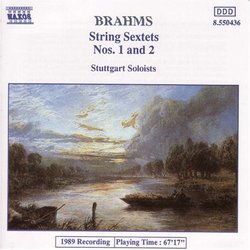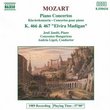Goodish, and Budget-Priced, but Not Quite Good Enough
J Scott Morrison | Middlebury VT, USA | 02/14/2005
(4 out of 5 stars)
"There are many recordings of Brahms's two sextets. They are such favorites of string players that just about any time the appropriate six instruments get together, out comes the Brahms. It is no surprise, then, that this group of which I'd never heard (and about which Naxos doesn't tell us much, even to omitting the names of the individual players) would play and record these gems. The players are clearly very good, and the traversals are clearly well thought out. And there are some felicities worth mentioning. For instance, each of the variations in the second movement of the First Sextet is neatly characterized, possibly as well as I've ever heard. But overall there is rather a bashful quality to the playing, almost as if the players were afraid to dig into their strings. And the entire Second Sextet seems to lose rhythmic point. Listen to the tentative first and third movements of the Op. 36. It's nice, but is it Brahms? It almost sound like they're trying to make him sound like Fauré.
Still, for someone on a tight budget and unfamiliar with these well-beloved works, this might be an option. As for me, I think I'll stick with the performances of the Raphael Ensemble on Hyperion or the St.-Martin-in-the-Fields Chamber Players on Chandos.
Scott Morrison"
A Brahmsian Bargain
M. C. Passarella | Lawrenceville, GA | 10/09/2008
(5 out of 5 stars)
"Here are two of Brahms' sunniest, most immediately attractive chamber works in performances to match. One reviewer I've read places the Second Sextet in an inferior position, thinking Brahms was merely repeating himself, trying to recapture the success of the First and just going through the motions. I humbly disagree. In fact, it doesn't seem at all that Brahms was repeating himself.
In the First Sextet, he appears consciously to imitate 18th-century entertainment music, as he did in his roughly contemporaneous First Serenade. In the Second Sextet, written four years later, Brahms appears to be updating the classicism of Mozart and Beethoven, setting a romantic stamp on the clear structures and transparent scoring of his predecessors. This is evident in the weightiness of the first movement development section, or the odd melancholy of the second movement scherzo. Sheer youthful charm has been replaced by something a bit deeper, a bit mellower, hinting at the Brahms to come. This is true of the boisterous trio as well, which gives a foretaste of future folk-tinged music, such as the Liebeslieder Walzes.
The Stuttgarters play with an obvious affection for both works and a clear appreciation of the differences between them. I'm especially impressed with the rich baseline that the Stuttgart cellos and violas provide. The intimate recording is just right as well. Given the budget price, this disk is a bargain and then some.
"

![header=[] body=[This CD is available to be requested as disc only.]](/images/attributes/disc.png?v=430e6b0a)
![header=[] body=[This CD is unavailable to be requested with the disc and back insert at this time.]](/images/attributes/greyed_disc_back.png?v=430e6b0a)
![header=[] body=[This CD is available to be requested with the disc and front insert.]](/images/attributes/disc_front.png?v=430e6b0a)
![header=[] body=[This CD is unavailable to be requested with the disc, front and back inserts at this time.]](/images/attributes/greyed_disc_front_back.png?v=430e6b0a)

 Track Listings (8) - Disc #1
Track Listings (8) - Disc #1

